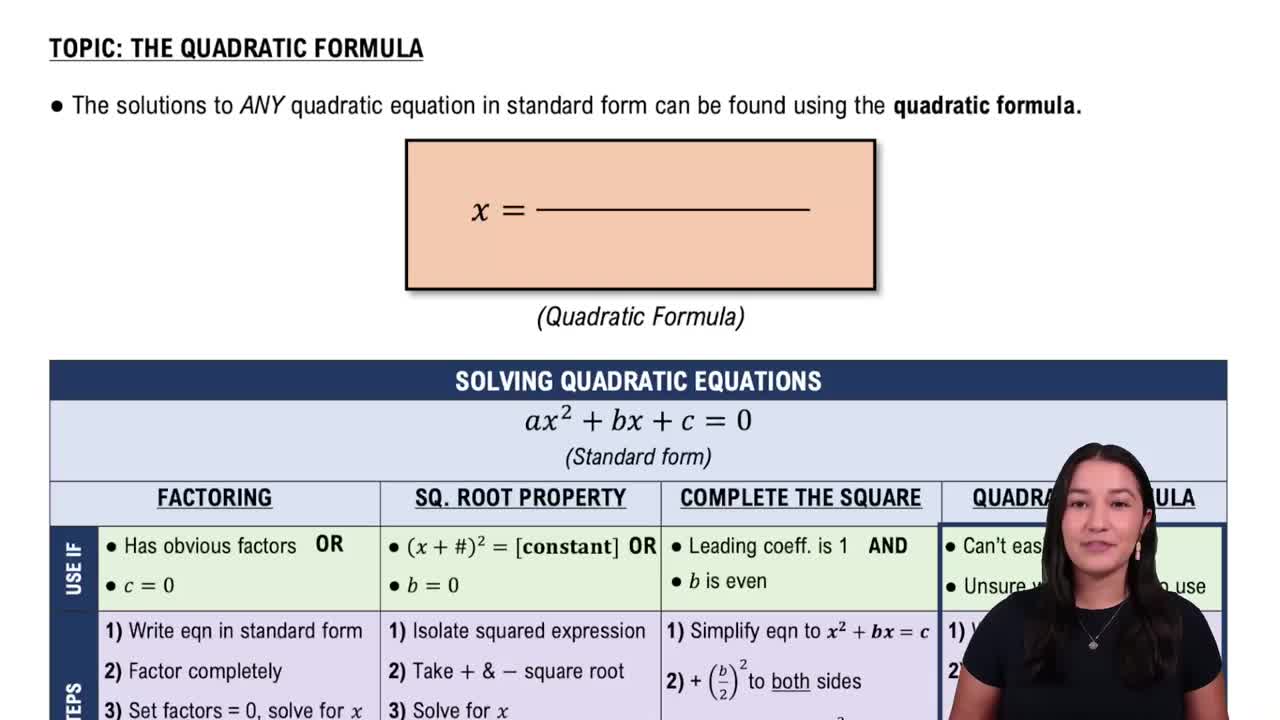Table of contents
- 0. Review of Algebra4h 16m
- 1. Equations & Inequalities3h 18m
- 2. Graphs of Equations43m
- 3. Functions2h 17m
- 4. Polynomial Functions1h 44m
- 5. Rational Functions1h 23m
- 6. Exponential & Logarithmic Functions2h 28m
- 7. Systems of Equations & Matrices4h 6m
- 8. Conic Sections2h 23m
- 9. Sequences, Series, & Induction1h 19m
- 10. Combinatorics & Probability1h 45m
9. Sequences, Series, & Induction
Arithmetic Sequences
Problem 41a
Textbook Question
Find the sum of the first 60 positive even integers.
 Verified step by step guidance
Verified step by step guidance1
Recognize that the sequence of the first 60 positive even integers is an arithmetic sequence where the first term \( a_1 = 2 \) and the common difference \( d = 2 \).
Use the formula for the sum of an arithmetic sequence: \( S_n = \frac{n}{2} (a_1 + a_n) \), where \( n \) is the number of terms, \( a_1 \) is the first term, and \( a_n \) is the last term.
Determine the last term \( a_n \) of the sequence. Since the sequence is even integers, \( a_n = 2n \). For 60 terms, \( a_{60} = 2 \times 60 \).
Substitute \( n = 60 \), \( a_1 = 2 \), and \( a_{60} = 120 \) into the sum formula: \( S_{60} = \frac{60}{2} (2 + 120) \).
Simplify the expression to find the sum: \( S_{60} = 30 \times 122 \).
Recommended similar problem, with video answer:
 Verified Solution
Verified SolutionThis video solution was recommended by our tutors as helpful for the problem above
Video duration:
4mPlay a video:
Was this helpful?
Key Concepts
Here are the essential concepts you must grasp in order to answer the question correctly.
Even Integers
Even integers are whole numbers that are divisible by 2 without a remainder. They can be expressed in the form of 2n, where n is an integer. The sequence of positive even integers starts from 2 and continues as 2, 4, 6, 8, and so on. Understanding this concept is crucial for identifying the specific integers involved in the problem.
Recommended video:
Guided course

Introduction to Sequences
Arithmetic Series
An arithmetic series is the sum of the terms of an arithmetic sequence, where each term is obtained by adding a constant difference to the previous term. The sum of the first n terms can be calculated using the formula S_n = n/2 * (a + l), where S_n is the sum, n is the number of terms, a is the first term, and l is the last term. This concept is essential for efficiently calculating the sum of the first 60 positive even integers.
Recommended video:
Guided course

Arithmetic Sequences - General Formula
Formula for the Sum of Even Integers
The sum of the first n positive even integers can be calculated using the formula S = n(n + 1), where n is the number of even integers. This formula arises from the properties of arithmetic series and simplifies the calculation process. For the question at hand, applying this formula will yield the sum of the first 60 positive even integers directly.
Recommended video:

Solving Quadratic Equations Using The Quadratic Formula

 6:4m
6:4mWatch next
Master Arithmetic Sequences - Recursive Formula with a bite sized video explanation from Patrick Ford
Start learning



